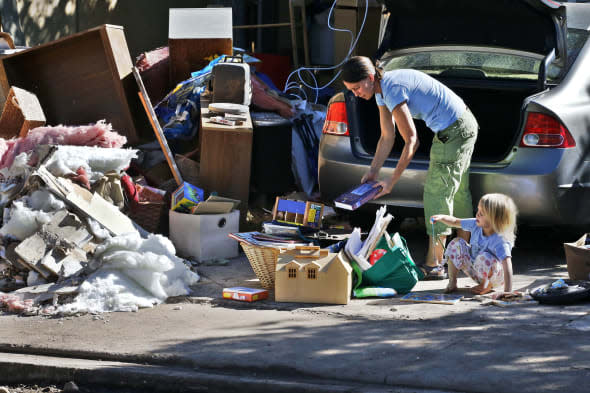What Renters Should Do Before Natural Disaster Strikes

When natural disaster strikes, a tornado, flood or hurricane does not discriminate between renters and homeowners. And renters are often more vulnerable to material losses than homeowners because they are less prepared. However, some fast-acting tenants in Colorado's floodwaters reportedly helped save not just many of their own belongings, but also spared their landlord much more serious damage to his property.
Renter Jaime Morton returned home Sept. 12 from a night out of town to find more than a foot of water in the basement of her rental home, reported the Boulder Daily Camera. She immediately called her landlord, who lived in one of the areas hardest hit by the floods, but did not reach him. As she waited for his return call she saw more damage occurring as stones started falling from the walls of the earthen basement and the smell of mold filled the home.
So Morton and her roommates decided to take matters into their own hands. "We hadn't heard back from our landlord about what we thought we needed to do, so we just ripped out the carpets, pads and rotten plywood underneath," Morton told the paper. "Once we got to the plywood on top of the dirt, though, we realized that some of it seemed to be bolstering the dirt shelf that the water heater and furnace are based on, so we didn't want to mess with that and potentially be liable for any more erosion or damage, but it was a hard call because we didn't want to leave anything that was holding water down there."
In the end, the landlord -- who it turned out was safe and dry away in California -- praised their actions and took care of the rest. Not every landlord may react the same to hear that their tenants pulled out plywood floorboards. So this is the kind of conversation you might want to have with your landlord before disaster strikes. Here are some key ways to prepare:
1. Check your lease. When you're signing your lease or even if you already have, check with your landlord about a plan in case of disaster. Sure they may have provided a phone number in case of emergencies, but the plan should indicate what you can and shouldn't do in disaster emergency cases when they cannot be reached. This is especially important if you live in areas prone to floods, earthquakes, tornadoes or hurricanes. (Some of Colorado's flood victims are pictured above.)
2. Develop an evacuation plan. In your plan you might list where you'll go in case of a disaster (to a cousin's house or to the roof), but a part of your plan should include how and when you'll contact your landlord or property management company. And you should discuss this with them in advance. This way the landlord is aware as to whether or not you might still be in the unit or have left. Did you turn off the main power before leaving?
3. Investigate your lease options. If your apartment is declared "uninhabitable," your state laws may allow you to legally break your lease, receive a refund, or stop payments until the damage is fixed, but this is also something you can spell out in your lease or a separate disaster plan addendum. Perhaps your landlord would even help cover the cost of a hotel room or provide a safe unit if you have to move out of yours temporarily while the damage is fixed.
4. Look into renter's insurance. Even if you think your landlord will be responsible if your items are damaged in a natural disaster, know that it's not likely. Think of natural disasters as "no-fault accidents." If your items are damaged by water from pipes that broke due to disaster, your landlord's insurance will not cover your goods. Make sure your renter's insurance has a clause that covers you in the event of a natural disaster. In some cases you may have to carry extra insurance for these matters. That was a lesson Joyce Jones learned the hard way while living in New Orleans in 2005 when Hurricane Katrina hit. As AOL Real Estate reported, Jones evacuated before the levees broke, but her rental apartment was in shambles when she returned to it three weeks later. "I didn't have any coverage so I just lost everything," she said.
5. Consider where you'll live afterward. After a disaster, it's typical that housing becomes scarce with so many damaged buildings. Rents may even go up after major repairs and reconstruction. So you may want to put in your agreement with your landlord that you would like to keep your lease in force at the current rent, provided that rent monies due are suspended if you cannot live in the dwelling while the landlord is repairing or restoring the unit.
More about renting:
Smart and Legal Ways to Break an Apartment Lease
America's Top 10 Disaster 'Safe Zones'
Alleged Thieves May Have Collected Rent on Someone Else's Foreclosure

